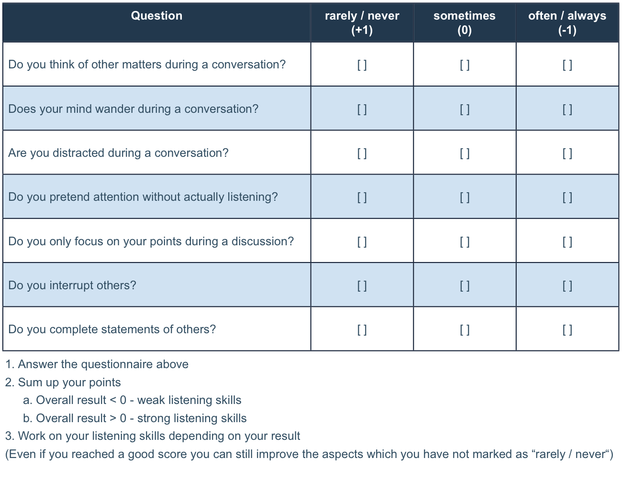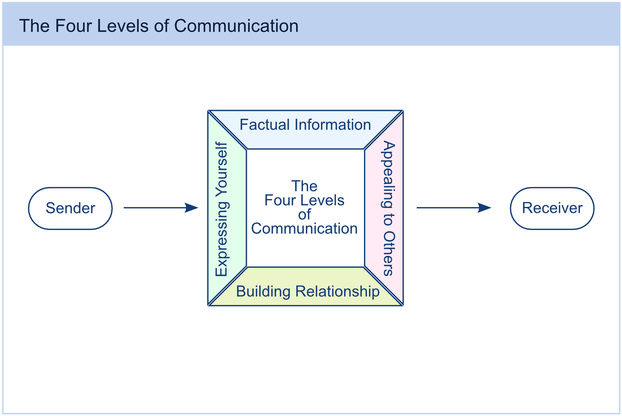It is not easy to find a communication style that suits the needs and personalities of all of the involved parties. Some people communicate too passively and submissive to enable the finding of a good solution; others are too dominant and aggressive and render a constructive discussion impossible. The key to good social interaction is assertive communication with seven key aspects.

The Seven Aspects of Assertive Communication
by godbersen
It is a fine line between aggressive or submissive and assertive communication. Seven characteristics of successful interactions can help you to establish good social relations.
1. Directly Connect with Your Communication Partners
It seems to be obvious that communication partners have to connect but quite a large number of conversations fail because there is a lack of actual interaction. When dealing with each other’s thoughts, feelings and positions direct contact is essential. This includes direct eye contact and other aspects of the body language as well as direct verbal addresses.
2. Respect Your Communication Partner
Direct contact with one or more communication partners requires respecting the points of view of the others. Everyone has an equal right to his or her position from which all involved parties can find a solution or position to agree on. Therefore, you should respect the opinions of others and take care that you do not demote your communication partners through statements which are aggressive, sarcastic, threatening…
3. Listen First Before You Respond
To find a common ground or solution you need to understand the initial position of your interaction partners. Therefore, you should firstly listen to what they have to say before you present your perspective.
- Focus on your communication partner
- Listen not only to the words but also to the expressed feelings of your communication partner
- Ask questions and paraphrase for a better understanding of your communication partner
- Take yourself back and let your communication partner speak
Good Listener Test
 |
4. Communicate Consistent with Your Personality
When you state your position you should consistently communicate referring to your general communication type. Depending on your personality you can be the rather vivacious or rather calm type, rather egocentric or exocentric and rather dominant or accepting. Like everyone else you have an equal right to your personal communication style. Just make sure that your type of communication matches your personality and does not contradict a constructive conversation.
5. Clearly State Your Position
Like you have the right to your personal style of communication you clearly have the same right to your own opinion as anyone else. Therefore, come to the point and express your feelings, thoughts and beliefs.
6. Communicate Openly and Honestly
You can only make clear statements which lead to constructive results if you are open and honest. Describe and explain your feelings and thoughts to which you are entirely entitled to.
7. Communicate Congruently
The techniques described before can only be successful if you congruently communicate on all levels of communication. This includes the several messages of the verbal communication as well as the signals deriving from your gestures and mimics
The Levels of Communication
 LifeWorld Social Health |
You might also like
Valentine's SymbolsRoses and chocolate are the most obvious symbols for Valentine's. But the sym...
How to Tell Someone You're Falling Out of LoveYou know something's changed, you just don't feel it anymore. Learn the best ...



 Stop Smoking with the Cognitive and Behavioral Therapyon 05/20/2013
Stop Smoking with the Cognitive and Behavioral Therapyon 05/20/2013
 What to Do When We Lose Our Freedom: The Principle of Reactance:on 05/20/2013
What to Do When We Lose Our Freedom: The Principle of Reactance:on 05/20/2013
 Fundamentals of Financial Analysis and Planning for Private Householdson 04/10/2013
Fundamentals of Financial Analysis and Planning for Private Householdson 04/10/2013
 Burnout in Caring and Social Professionson 03/06/2013
Burnout in Caring and Social Professionson 03/06/2013


Comments
Nice article. Also, those four levels of communication in the diagram are rather nice. Thanks for this.
People can be warm hearted but not appear so. People like this have much to offer, but may take some time to show it.
Also, have an open body language. People find it easier to deal with those they perceive as friendly than those who appear cold.